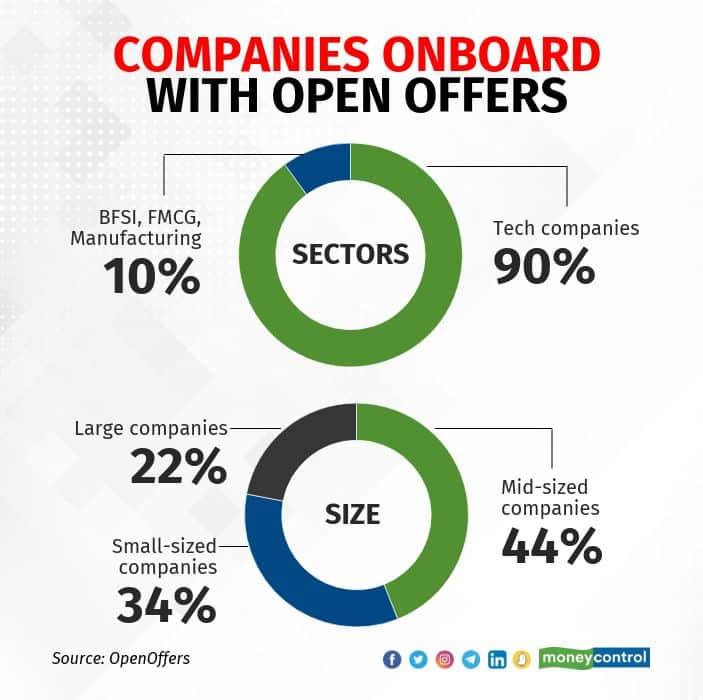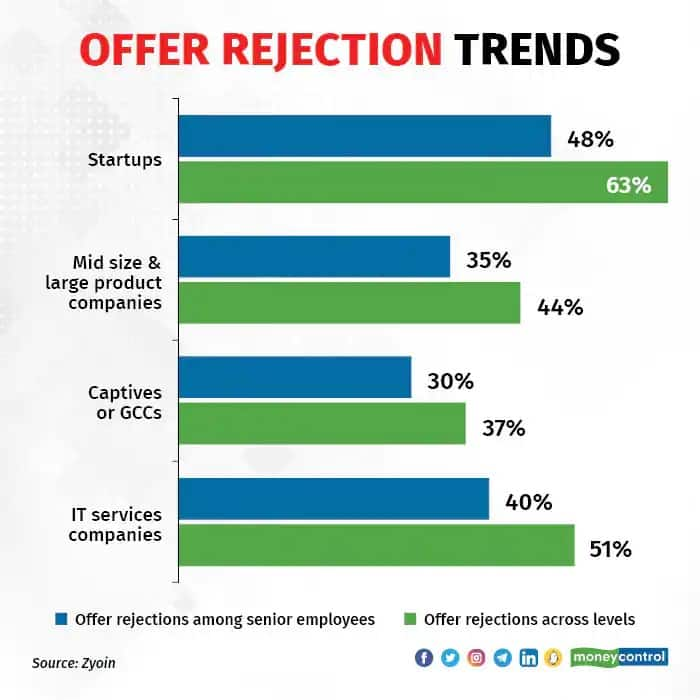



Ayushi Rungta has been in the recruitment and talent acquisition business for nearly a decade. Over the years, she has sometimes faced the challenge of candidates backing out from commitments at the last minute, not only when she worked at start-ups but also at large MNC IT brands.
Consequently, the companies failed to fill these positions in time, much to the detriment of their business. Rungta observed that some of the candidates who reneged on their commitments had 3-4 job offers in hand.
In 2021, Rungta and her team developed a ‘Commitment Intelligence Platform’ called OpenOffers. The platform addresses the commitment blind spot for enterprise recruiters between the offer rollout and candidate joining stage, which would normally force individual recruiters to call candidates and figure out whether they would be joining or not.
A commitment with OpenOffers starts from the time a candidate accepts an offer, to the time s/he either backs out or joins the employer, and goes up to three months after the official joining date. During this period, candidates are likely to give out multiple conflicting commitments, renegotiate the previous offer, extend the joining date and so on.
OpenOffers collates all these conflicting commitment signals on a single timeline anonymously and then computes a ‘candidate ghosting score’ and ‘joining propensity’ based on the commitment signals given to different companies, much like a CIBIL score for borrowers.
“OpenOffers is building a network of enterprises to anonymously share these commitment signals with each other,” says Rungta. In the 8 months since its launch, the platform has had 311 companies signing up for the service.
Candidate monitoring gaining tractionAmid the ongoing talent war, the widening salary gap between freshers and CXOs, and the advent of moonlighting, companies have begun tightening their HR processes.
It’s not just OpenOffers that has been tracking candidates’ commitment scores. Background verification firm TRST Score believes that all candidates have high ethical standards, to begin with, and hence everyone starts with a 1,000 score. Any adverse reporting by the organisation reduces that score, depending on the type and severity of the issue reported.

Parameters of the score include accepting offer letters and not joining, money fraud, moonlighting, absconding, timesheet fraud, harassment, expense fraud and many more.
“If a person is committing fraud as a borrower, the likelihood of them committing fraud as an employee is that much higher and vice versa. Hence, a 360-degree view becomes important,” Sudhakar Raja, Founder and CEO of TRST Score told Moneycontrol.
ALSO READ | Are unlimited and no-questions-asked leave policies working?TRST Score has over 2 lakh data entries from more than 150 companies. It integrates these into the HRMS, CRM and Underwriting platforms, which are in progress in multiple companies.
“Just these 150 companies have over 8 lakhs of data, which will soon be part of our platform. We are offering our services free for the first two years to 1,000 companies post which we intend to charge a nominal fee to check a TRST Score,” Raja says.
TRST Score’s Advisory Board has veteran CXOs, including Satish Mehta, former founding MD and CEO of CIBIL; Srinivas Acharya, former MD, Sundaram Home Finance; and N Sridhar, Secretary of NHRD – Chennai.
How exactly does it work?Before sending offers, companies on the background verification platform can check if a candidate has “accepted” an offer from another company in the TRST Score Network or OpenOffers. The company can still send an offer letter to the candidate and the candidate can accept this second offer. The previous company is immediately notified, informing it that its offer has been rejected so that it can scout for other candidates. Here, the candidate’s TRST Score dips.
This is to tackle challenges similar to what EaseMyTrip co-founder Prashant Pitt faced when a CXO-level candidate backed out from a job on the date of joining.
![]()
Generally, background verification firms base their scores on candidates’ historical data, which may have been filled in by recruiters or the companies that accepted a job offer. Recruiters begin posting an offer by first specifying the candidate’s income tax Permanent Account Number (PAN) on OpenOffers. If recruiters don’t have a candidate’s PAN details, they can use secondary identifiers such as their email address and phone number.
Are employees at fault?While companies have been blaming employees for “offer shopping”, moonlighting etc, employees have a different view.
“What about companies interviewing 20 candidates for 3 posts? Are they at fault,” asks Vipul Shah (name changed), 30, a Lucknow-based software developer.
Citing Article 21 of the Indian Constitution, Shah says every Indian citizen has the right to livelihood to sustain life with dignity. “It’s our choice whether we want to negotiate with three or five companies for a job role.”

Commenting on these developments, Harpreet Singh Saluja, President of NITES, a Pune-based labour union, said: “Companies are irked by the recent disruption in the talent market, which has given employees the upper hand.”
He feels the practice of tracking employees’ applications for job offers will not only reduce their chances of landing a job with a better salary but also dissuade them from leaving their existing employer. “Further, it seems like a blatant invasion of the right to privacy.”
ALSO READ | Now seniors too! Job offer shopping may soon enter boardroomsVineet Nayar, former CEO of HCLTech, told Moneycontrol that moonlighting is inevitable and has been made worse by low compensation and a lack of opportunities for innovation, despite efforts by Indian IT service companies to tackle the practice.
“Unless you increase your salaries dramatically which IT companies can due to margin pressures, there will be a dire need for this employee to find economic needs to meet his or her ends," he added.
Background check companies are flooding the market due to lax regulations, a lack of certifications and low entry barriers, Piyush Raj Akhouri, Co-Founder & Business Head at staffing firm Bridgentech Consulting, told Moneycontrol.
Because background checks are increasingly perceived to be something to be completed for compliance, he said it is only natural for hiring managers to choose the “cheapest” service provider, at the expense of authenticity.
“Even if all the information provided is accurate, there is still a possibility that an employee’s referral process could jeopardise the background check process,” he said. “The current employer may not be happy with the employee’s decision to leave and may withhold certain facts or omit crucial aspects.”
Akhouri says background verification companies could thus be invading the privacy of potential candidates, and for no benefit.
Are background verification firms invading privacy?OpenOffers said it doesn’t accept information about a candidate’s compensation, their position or any other personal information from the offer. Similarly, employees give consent for their backgrounds to be checked after which the TRST Score can be checked.

Both TRST Score and OpenOffers said in separate statements that they use empoyee PAN data provided by employers.
Legal experts say that it is valid for a person's PAN to be shared in this manner, provided he/she has consented for it.
Currently, the Information Technology Act, 2000 (IT Act) and the Information Technology (Reasonable Security Practices and Procedures and Sensitive Personal Data or Information) Rules, 2011 (Privacy Rules) govern data protection relating to individuals.
ALSO READ | Alarming gender gap: Women form just a quarter of top Indian companies' staffAccording to Siddharth Suresh, Partner, DSK Legal, the Privacy Rules categorise data into two aspects: ‘personal data’ and ‘sensitive personal data’. The sensitive personal data of a person cannot be shared with any other person by the recipient, except with the prior written consent of the disclosing party.
“These restrictions do not, however, apply to information that is already available in the public domain. Therefore, if the background verifier is sharing information that is in the public domain, such as LinkedIn profile of the candidate, which is already in the public domain. There is no violation of data protection laws by the verifier,” Suresh said.
What is relevant here is the source of information — whether the background verifier derived information about a candidate from the candidate herself or through any other source, such as Naukri.com.
“If the information is provided by the candidate to the background verification firm, then the candidate must have consented to disclosure of their resume/personal data with prospective employers,” Suresh said. In such a context, he said, the disclosure of information about the candidate does not violate India’s data protection laws.
Recently, Parliament released the draft of the new Digital Data Protection Bill, 2022, which will significantly alter compliance norms and restrictions applicable to data controllers and processors operating in India, if approved.
ALSO READ | Fintech startup to introduce ‘attitude bonus’: Good but tricky initiative?“Although at present there is no clear timeline for the enactment of the new Bill, it will be intriguing to see how it changes the data privacy landscape in India,” said Suresh.
Raja of TRST Score feels the current background verification process has been in place for many years, and his company is only enhancing the value chain. “Hence we don’t foresee unions getting involved.”
“Only 10 percent of the workforce will be bad apples. The rest of the employees will be happy as they have nothing to fear — they will have the maximum 1,000 points and this will help them in their career pursuits,” he added.
Discover the latest Business News, Sensex, and Nifty updates. Obtain Personal Finance insights, tax queries, and expert opinions on Moneycontrol or download the Moneycontrol App to stay updated!
Find the best of Al News in one place, specially curated for you every weekend.
Stay on top of the latest tech trends and biggest startup news.